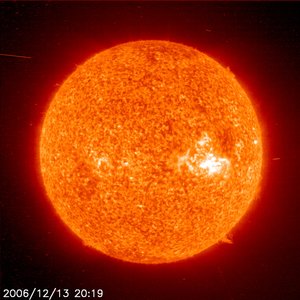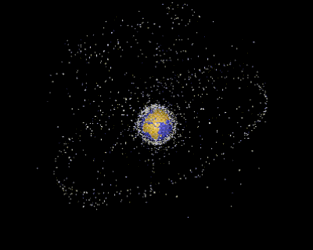SSA: Five questions with ESA's Nicolas Bobrinsky
The Space Situational Awareness (SSA) Preparatory Programme is a new initiative to be presented at this month's ESA Ministerial Council meeting in The Hague. SSA directly serves the strategic aims of the European Space Policy (ESP) by supporting the independent capacity to securely, sustainably and safely operate Europe's critical space infrastructure. SSA also serves the EU Lisbon Objectives by supporting the development of new applications, new jobs and new market opportunities in the space sector.

Nicolas Bobrinsky has worked at ESA's European Space Operations Centre (ESOC), Darmstadt, Germany, since 1987, where he is presently Head of the Ground Station Systems Division. He has extensive experience in the planning and architecture of space-related infrastructure such as ground stations, communication networks and mission control systems, and he has worked on numerous projects with ESA partners including the US, Russian, Japanese and European national space agencies.
He is responsible for finalising the Space Situational Awareness (SSA) Preparatory Programme proposal, and has been involved with SSA since June 2007.
ESA: In plain language, what is the purpose of SSA?
Nicolas Bobrinsky
The purpose of the European Space Situational Awareness (SSA) initiative proposed by ESA is to provide Europe and its citizens complete and accurate information on objects orbiting Earth, on the space environment and on threats coming from space. The SSA system proposed by ESA will operate in two specific areas. The first is surveillance of objects orbiting the Earth in various orbits - to be achieved by detecting, tracking and imaging these objects. The second is space weather - addressing primarily the effect of solar activity on satellites and ground infrastructure such as power grids and communication networks.
The observation of the space environment includes identifying and assessing asteroids and comets, known as Near-Earth Objects (NEO), that pose a potential risk of collision with the Earth.
As a first step in the development of a European SSA system, ESA will initiate the SSA Preparatory Programme. It will focus on the architecture of the future system, the specification of requirements and the provision of a set of precursor services covering the most urgent needs and based on existing assets.
The SSA Preparatory Programme will also develop pilot data centres to prepare for the provision of future services in different areas and strategic elements of surveillance radars and telescopes.
An autonomous SSA capability will enable Europe to play a fundamental role in support of the peaceful uses of outer space.
ESA: Why do we need SSA?
Nicolas Bobrinsky
Space-based systems have become indispensable enablers for a wide range of services critical to Europe's economies and governmental functions, and this dependency will likely only grow in the future.
Any shut-down or loss of services from these systems would seriously affect a wide range of commercial and civil activities, including land and air travel, maritime navigation, telecommunications, climate monitoring and weather forecasting, to name just a few. For example a loss of space-based services could considerably impair the delivery of national emergency services, such as air/sea rescue or disaster recovery, in the event of any concurrent natural or man-made disaster, such as flooding or a chemical spill.
Today, Europe is dependent on the goodwill of non-European space powers to receive essential information on what is happening above our heads. For example, databases of satellite orbits and debris objects are not fully disclosed to us due to the sensitivity of the information; sometimes, the information we receive is insufficiently accurate. Thus, we in Europe cannot fully assess threats to our satellites or take timely action in full independence by, for example, performing a debris avoidance manoeuvre.
Also, if we build up a European SSA system we would be in a much better position to strengthen international cooperation in this domain. For instance, cooperation between the US and Europe would bring benefits to both in this area.
ESA: What are some concrete examples where SSA would benefit Europe?
Nicolas Bobrinsky
There are well-documented cases recently of ESA and CNES (French space agency) satellites being threatened by collision with large chunks of debris from other satellites or pieces of burnt-out rocket stages. In both cases, the agency involved had to quickly refine first-hand knowledge of the threatening objects' orbits through intensive tracking campaigns, and initiate avoidance manoeuvres to protect their satellites. It is to be noted that the initial warning of the collision risk was only possible thanks to the availability of orbital data graciously made available to Europe by another space power. If this data were for any reason restricted, European space agencies would be left in the dark.
Another example, for space weather: In December 2006, ESA's Cluster II, Envisat and Integral all experienced instrument shut-downs shortly after a powerful coronal mass ejection arrived at Earth from the Sun; solar activity also regularly affects communication networks, navigation and terrestrial power grids.
Finally, consider Near-Earth Objects. A 300m-wide asteroid colliding with the Earth would wipe out a medium-size country; 1000m or more would provoke a global catastrophe. At present, only a very partial knowledge of the threatening NEO population is available. The Apophis asteroid, which will skim by Earth in 2029 and 2036, was only discovered in 2004. It has a diameter of approximately 270m and a mass of 21 million tonnes and therefore represents the type of object we want to keep an eye on.
SSA will dramatically increase our knowledge and understanding of the global situation in space.
ESA: Why is ESA the best choice to develop an SSA system in Europe?
Nicolas Bobrinsky
By its nature, a European SSA system should be developed by a European organisation in order to attract the highest possible support among interested European States.
Many discussions have recently taken place within the SSA User Representatives Group, including representatives of national space agencies, defence ministries and European institutions. The conclusion of these discussions was that ESA should take the initiative to start this work now. We don't know yet how longer-term responsibilities will be arranged, but for sure, ESA has the know-how, technical skills and capabilities to develop the systems, apart from the fact that we would also be a main customer of these services.
Remember that many of the SSA activities are already on-going as pilot activities in ESA, such as activities and research at the Space Debris Office here at ESOC and the Space Weather and NEO projects at ESA's ESTEC Establishment in The Netherlands.
ESA: Is SSA worth the cost?
Nicolas Bobrinsky
Absolutely, yes - it is a very wise investment. The SSA Preparatory Programme to be proposed at the November 2008 ESA Ministerial Council represents an overall investment of €620 million over 10 years, with the initial three-year phase accounting for €55 million.
SSA will dramatically increase our knowledge and understanding of the global situation in space. SSA makes Europe better prepared to react to any risk represented by the loss of a satellite or related services, or by a collision with an asteroid or a comet. Against a relatively modest investment, Europe will be able to actively cooperate with major space partners, such as the US; right now, we have little to offer.
An autonomous SSA capability will also enable Europe to play a fundamental role in support of the peaceful uses of outer space by providing the international community with independent options to verify compliance with international treaties and codes of conduct.
Contact
Nicolas Bobrinsky
Head of the Ground Station Systems Division
ESA/ESOC, Darmstadt, Germany
Tel: +49-6151-90-0
nicolas.bobrinsky [@] esa.int
Corporate Communication Office:
ESA/ESOC, Darmstadt, Germany
Tel: +49-6151-90-2516







